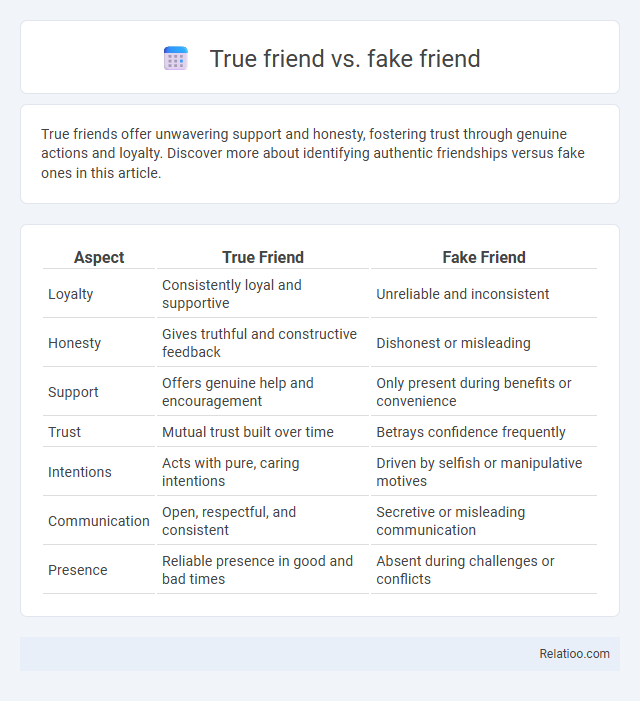True friends offer unwavering support and honesty, fostering trust through genuine actions and loyalty. Discover more about identifying authentic friendships versus fake ones in this article.
Table of Comparison
| Aspect | True Friend | Fake Friend |
|---|---|---|
| Loyalty | Consistently loyal and supportive | Unreliable and inconsistent |
| Honesty | Gives truthful and constructive feedback | Dishonest or misleading |
| Support | Offers genuine help and encouragement | Only present during benefits or convenience |
| Trust | Mutual trust built over time | Betrays confidence frequently |
| Intentions | Acts with pure, caring intentions | Driven by selfish or manipulative motives |
| Communication | Open, respectful, and consistent | Secretive or misleading communication |
| Presence | Reliable presence in good and bad times | Absent during challenges or conflicts |
Understanding the Meaning of True Friendship
True friendship embodies trust, loyalty, and unconditional support, distinguishing genuine connections from fake friends who may harbor hidden agendas or insincerity. Fake friends often reveal their true nature through inconsistent behavior, betrayal, or lack of empathy, making it essential to recognize these signs to protect your emotional well-being. Understanding the meaning of true friendship helps you identify individuals who prioritize your happiness and confidentiality, fostering deeply meaningful and lasting relationships.
Key Traits of a True Friend
A true friend exemplifies loyalty, honesty, and unwavering support, standing by your side through challenges and successes. Unlike fake friends who often display deceit, inconsistency, and self-interest, a true friend communicates openly and respects boundaries without hidden agendas. Secrets shared with a true friend are safeguarded with trust and discretion, reinforcing a bond built on mutual respect and heartfelt sincerity.
Warning Signs of a Fake Friend
A fake friend often shows warning signs such as inconsistency in words and actions, lack of genuine support during tough times, and a tendency to gossip or betray your trust. They may frequently manipulate situations for their own benefit or only reach out when they need something from you. Recognizing these behaviors protects your emotional well-being and helps you surround Yourself with true friends who value honesty and loyalty.
Trustworthiness: The True Friend’s Foundation
True friends demonstrate unwavering trustworthiness, consistently supporting your values and keeping confidences without hesitation. Fake friends often betray trust, spreading secrets and prioritizing self-interest over loyalty. Your true friend builds a solid foundation through honesty, reliability, and genuine care, ensuring your secrets remain safe and your bond remains strong.
Loyalty and Support in Friendships
True friends demonstrate unwavering loyalty and consistent support through both good times and challenges, providing a reliable foundation for your emotional well-being. Fake friends lack genuine commitment, often abandoning you when loyalty is most needed, revealing conditional or self-serving motives. Secrets in friendships test trust, where true friends respect confidentiality, reinforcing mutual respect and deepening the bond.
How Fake Friends Manipulate and Betray
Fake friends often manipulate trust by pretending loyalty while exploiting vulnerabilities for personal gain, creating a facade of friendship that conceals hidden agendas. Their betrayal typically involves spreading rumors, withholding support during critical times, and acting deceitfully to harm reputations or relationships. In contrast, true friends offer consistent honesty and authentic support, while secrets can either strengthen or damage friendships depending on their nature and disclosure.
The Importance of Honest Communication
Honest communication is the cornerstone that distinguishes a true friend from a fake friend and preserves the integrity of secrets shared. True friends build trust through transparency and open dialogue, fostering deep connections, while fake friends often resort to deception and betrayal, compromising confidentiality. Maintaining honest communication ensures secrets are respected and friendships remain authentic and resilient.
Navigating Conflict with Real Friends vs Fake Friends
Navigating conflict with real friends involves open communication, trust, and mutual respect, allowing you to resolve misunderstandings and strengthen your bond. In contrast, fake friends often avoid honest conversations, create drama, and undermine your trust, making conflicts harder to resolve and damaging your emotional well-being. Your ability to discern these differences helps protect your mental health and cultivates meaningful, supportive relationships.
Emotional Impact of True vs Fake Friendships
True friendships provide emotional stability, trust, and unconditional support, fostering mental well-being and resilience. Fake friendships often lead to feelings of betrayal, insecurity, and emotional exhaustion due to deceit and superficial interactions. Secrets shared within true friendships strengthen bonds by promoting vulnerability, while in fake friendships, secrets can become tools for manipulation and harm.
Tips to Foster Genuine Friendships and Avoid Toxic Ones
To foster genuine friendships, prioritize honesty, active listening, and mutual respect in your interactions, ensuring your connections are built on trust and authenticity. Recognize fake friends by their consistent lack of support, insincerity, and tendency to create drama, which can drain your emotional energy and hamper personal growth. Protect your secrets by sharing them only with trusted friends who demonstrate loyalty and confidentiality, helping to cultivate a safe and nurturing social circle.

Infographic: True friend vs Fake friend
 relatioo.com
relatioo.com